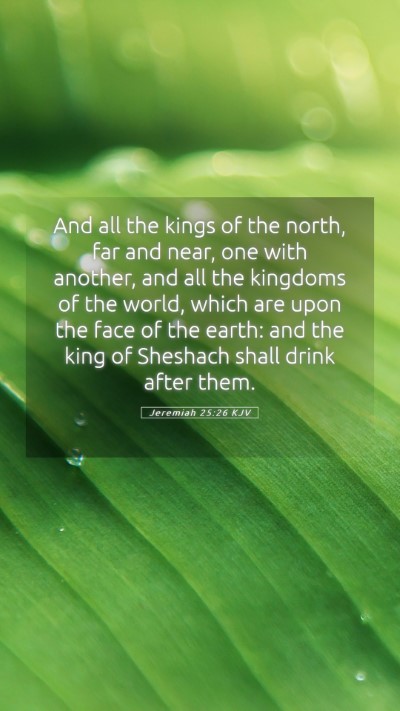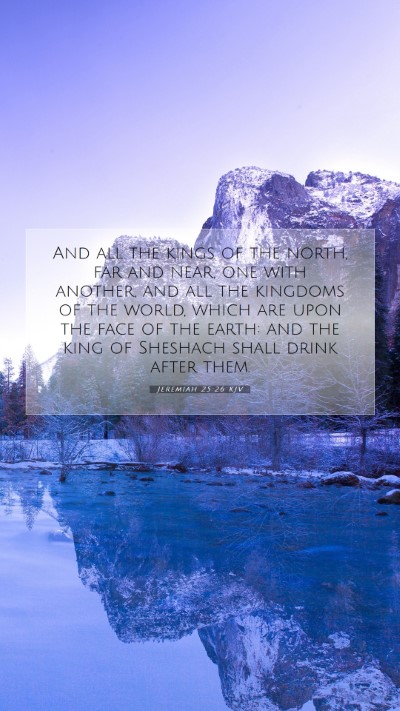Understanding Jeremiah 25:26
The verse Jeremiah 25:26 states, "And all the kings of the north, which are near, and far off, one with another, and all the kingdoms of the world, which are upon the face of the earth: and the king of Sheshach shall drink after them." This verse highlights the divine judgement that is to come upon all nations, symbolizing God's sovereignty over earthly kings and kingdoms.
In this interpretation, it is crucial to understand the context of Jeremiah's prophecy and the historical backdrop of Israel's exile. The implications of "all the kings" indicate that no one is exempt from God's judgment, regardless of their power or distance from Jerusalem.
Key Insights from Commentators
-
Matthew Henry:
Henry emphasizes the universality of God's rule and judgement. The "kings of the north" may represent not just geographical foes of Israel but also spiritual adversities that challenge God's people. He indicates that the imagery of drinking from the cup suggests experiencing God's wrath, which serves as a powerful metaphor throughout Scripture for divine punishment.
-
Albert Barnes:
Barnes points to the prophetic nature of this verse, interpreting the "king of Sheshach" as a metaphor for Babylon. In his commentary, Sheshach symbolizes the power that oppresses God’s people. The call for these kings to drink indicates a coming reckoning, where they will face the consequences of their actions against God’s chosen.
-
Adam Clarke:
Clarke delves into the historical significance of the kingdoms mentioned. He notes the comprehensive aspect of judgment, encompassing not just Israel but various nations, suggesting that God's plans involve the entirety of mankind, not limited to a single people group. His interpretation reinforces the idea that God's authority extends beyond Israel, encompassing all of creation.
Biblical Exegesis: Theological Implications
The theological implications of Jeremiah 25:26 are profound. The verse serves as a reminder of God's ultimate authority and the necessity of divine justice across all nations. The act of "drinking" is emblematic of internalizing God's wrath, indicating a tumultuous future for the unrepentant.
From a broader perspective, this verse invites readers into a deeper analysis of God's interactions with humanity and the consequences of collective moral failings. It aligns with themes found throughout the Bible, where God deals justly with nations.
Application to Daily Life
Understanding this verse can yield valuable insights when striving to live in accordance with God's will. It calls believers to reflect on the weight of their actions in a global context and to uphold justice and righteousness as key tenets of their faith.
Furthermore, it serves as a cautionary tale about the repercussions of turning away from God—highlighting the importance of community, accountability, and vigilance in moral living.
Related Cross References
- Jeremiah 25:16: Discusses the consumption of God's judgment.
- Isaiah 51:17: Speaks to the cup of wrath being poured out.
- Revelation 14:10: References drinking the wine of God's fury.
- Jeremiah 46:10: Relates to the day of the Lord's vengeance.
Conclusion: A Call for Reflection
Jeremiah 25:26 ultimately serves as a profound Biblical verse commentary on the nature of divine justice. The call to understand scripture within this context speaks to the essence of biblical study—aligning our lives with God's word while recognizing the universal call to accountability among nations.
As you delve into these scripture analyses, consider how these insights shaped the prophetic landscape and the lessons they hold for today’s believers. This verse encapsulates a warning as well as an affirmation of God's eternal jurisdiction over all creation.


